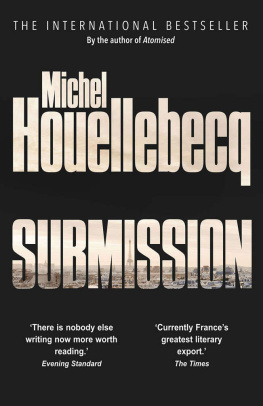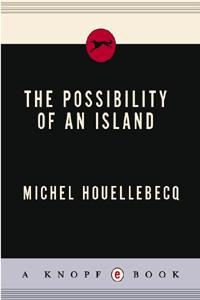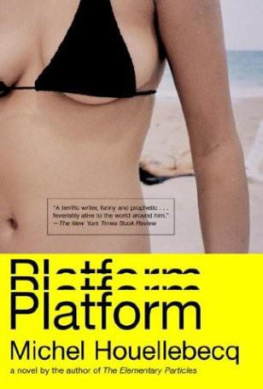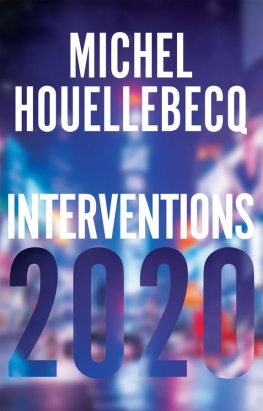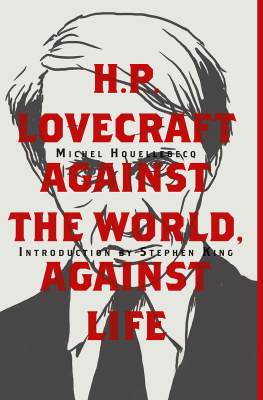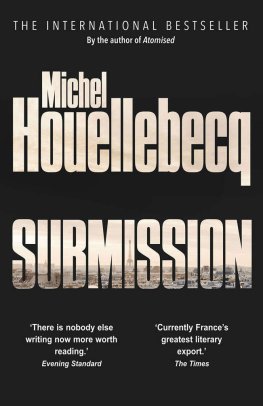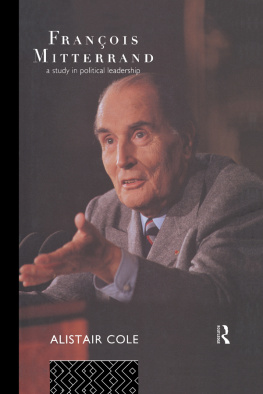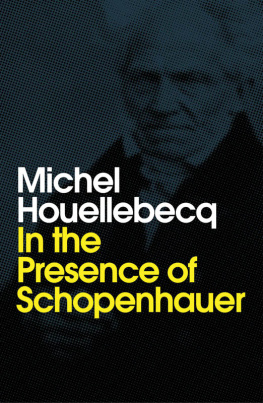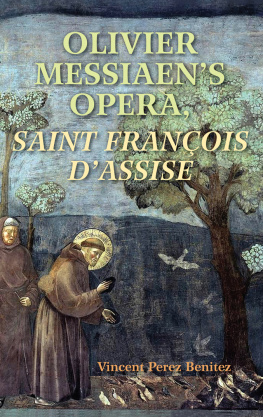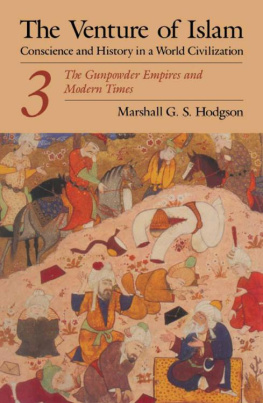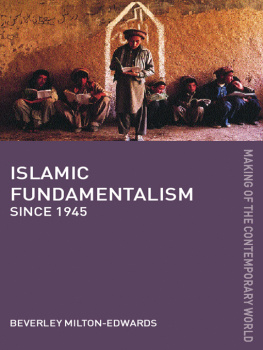Contents
ABOUT THE BOOK
In a near-future France, Franois, a middle-aged academic, is watching his life slowly dwindle to nothing. His sex drive is diminished, his parents are dead, and his lifelong obsession the ideas and works of the nineteenth-century novelist Joris-Karl Huysmans has led him nowhere. In a late-capitalist society where consumerism has become the new religion, Franois is spiritually barren, but seeking to fill the vacuum of his existence.
And he is not alone. As the 2022 Presidential election approaches, two candidates emerge as favourites: Marine Le Pen of the Front National, and Muhammed Ben Abbes of the nascent Muslim Fraternity. Forming a controversial alliance with the mainstream parties, Ben Abbes sweeps to power, and overnight the country is transformed. Islamic law comes into force: women are veiled, polygamy is encouraged and, for Franois, life is set on a new course.
Submission is both a devastating satire and a profound meditation on isolation, faith and love. It is a startling new work by one of the most provocative and prescient novelists of today.
A NOTE ABOUT THE AUTHOR
Michel Houellebecq is a French novelist, poet and literary critic. His novels include the international bestseller Atomised and The Map and the Territory, which won the 2010 Prix Goncourt. He lives in France.
A NOTE ABOUT THE TRANSLATOR
Lorin Stein is the editor of The Paris Review. He lives in New York.
ALSO BY MICHEL HOUELLEBECQ
FICTION
Whatever
Atomised
Platform
Lanzarote
The Possibility of an Island
The Map and the Territory
NON-FICTION
H. P. Lovecraft: Against the World, Against Life
Public Enemies (with Bernard-Henri Levy)
A noise recalled him to Saint-Sulpice; the choir was leaving; the church was about to close. I should have tried to pray, he thought. It would have been better than sitting here in the empty church, dreaming in my chair but pray? I have no desire to pray. I am haunted by Catholicism, intoxicated by its atmosphere of incense and wax. I hover on its outskirts, moved to tears by its prayers, touched to the very marrow by its psalms and chants. I am thoroughly disgusted with my life, I am sick of myself but so far from changing my ways! And yet and yet if I am troubled in these chapels, as soon as I leave them I become unmoved and dry. In the end, he told himself, as he rose and followed the last ones out, shepherded by the Swiss guard, in the end, my heart is hardened and smoked dry by dissipation. I am good for nothing.
J.-K. Huysmans, En route
Through all the years of my sad youth Huysmans remained a companion, a faithful friend; never once did I doubt him, never once was I tempted to drop him or take up another subject; then, one afternoon in June 2007, after waiting and putting it off as long as I could, even slightly longer than was allowed, I defended my dissertation, Joris-Karl Huysmans: Out of the Tunnel, before the jury of the University of Paris IV-Sorbonne. The next morning (or maybe that evening, I dont remember: I spent the night of my defence alone and very drunk) I realised that part of my life, probably the best part, was behind me.
So it goes, in the remaining Western social democracies, when you finish your studies, but most students dont notice right away because theyre hypnotised by the desire for money or, if theyre more primitive, the desire for consumer goods (though these cases of acute product-addiction are unusual: the mature, thoughtful majority develop a fascination with that tireless Proteus, money itself). Above all theyre hypnotised by the desire to make their mark, to carve out an enviable social position in a world that they believe and indeed hope will be competitive, galvanised as they are by the worship of fleeting icons: athletes, fashion or Web designers, film stars and models.
For various psychological reasons that I have neither the skill nor the desire to analyse, I wasnt that way at all. On 1 April 1866, at the age of eighteen, Joris-Karl Huysmans began his career as a low-ranking civil servant in the French Ministry of the Interior and Ecclesiastical Affairs. In 1874 he published, at his own expense, a first collection of prose poems, Le drageoir pices. It received very little attention, except for one extremely warm review by Thodore de Banville. Such were his quiet beginnings.
His life as a bureaucrat went on, and so did the rest of his life. On 3 September 1893, he received the Lgion dHonneur for public service. In 1898 he retired, having completed once leaves of absence were taken into account his mandatory thirty years of employment. In that time he had managed to write books that made me consider him a friend more than a hundred years later. Much, maybe too much, has been written about literature. (I know better than anyone; Im an expert in the field.) Yet the special thing about literature, the major art form of a Western civilisation now ending before our very eyes, is not hard to define. Like literature, music can overwhelm you with sudden emotion, can move you to absolute sorrow or ecstasy; like literature, painting has the power to astonish, and to make you see the world through fresh eyes. But only literature can put you in touch with another human spirit, as a whole, with all its weaknesses and grandeurs, its limitations, its pettinesses, its obsessions, its beliefs; with whatever it finds moving, interesting, exciting or repugnant. Only literature can give you access to a spirit from beyond the grave a more direct, more complete, deeper access than youd have in conversation with a friend. Even in our deepest, most lasting friendships, we never speak as openly as when we face a blank page and address a reader we do not know. The beauty of an authors style, the music of his sentences have their importance in literature, of course; the depth of an authors reflections, the originality of his thought certainly cant be overlooked; but an author is above all a human being, present in his books, and whether he writes very well or very badly hardly matters as long as he gets the books written and is, indeed, present in them. (Its strange that something so simple, so seemingly universal, should actually be so rare, and that this rarity, so easy to observe, should receive so little attention from philosophers in any discipline: for in principle human beings possess, if not the same quality, at least the same quantity of being; in principle they are all more or less equally present; and yet this is not the impression they give, at a distance of several centuries, and all too often, as we turn pages that seem to have been dictated more by the spirit of the age than by an individual, we watch these wavering, ever more ghostly, anonymous beings dissolve before our eyes.) In the same way, to love a book is, above all, to love its author: we want to meet him again, we want to spend our days with him. During the seven years it took me to write my dissertation, I lived with Huysmans, in his more or less permanent presence. Born in the rue Suger, having lived in the rue de Svres and the rue Monsieur, Huysmans died in the rue Saint-Placide and was buried in Montparnasse. He spent almost his entire life within the boundaries of the Sixth Arrondissement of Paris, just as he spent his professional life, thirty years and more of it, in the Ministry of the Interior and Ecclesiastical Affairs. I, too, lived in the Sixth Arrondissement, in a damp, cold, utterly cheerless room the windows overlooked a tiny courtyard, practically a well. When I got up in the morning, I had to turn on the light. I was poor, and if Id been given one of those polls that are always trying to take the pulse of the under-25s, I would certainly have ticked the box marked struggling, And yet the morning after I defended my dissertation (or maybe that same night), my first reaction was that I had lost something priceless, something Id never get back: my freedom. For several years, the last vestiges of a dying welfare state (scholarships, student discounts, health care, mediocre but cheap meals in the student cafeteria) had allowed me to spend my waking hours the way I chose: in the easy intellectual company of a friend. As Andr Breton pointed out, Huysmans sense of humour is uniquely generous. He lets the reader stay one step ahead of him, inviting us to laugh at him, and his overly plaintive, awful or ludicrous descriptions, even before he laughs at himself. No one appreciated that generosity more than I did, as I received my rations of celeriac remoulade and salt cod, each in its little compartment of the metal hospital tray issued by the Bullier student cafeteria (whose unfortunate patrons clearly had nowhere else to go, and had obviously been kicked out of all the acceptable student cafeterias, but who still had their student IDs you couldnt take away their student IDs), and I thought of Huysmans epithets the
Next page
